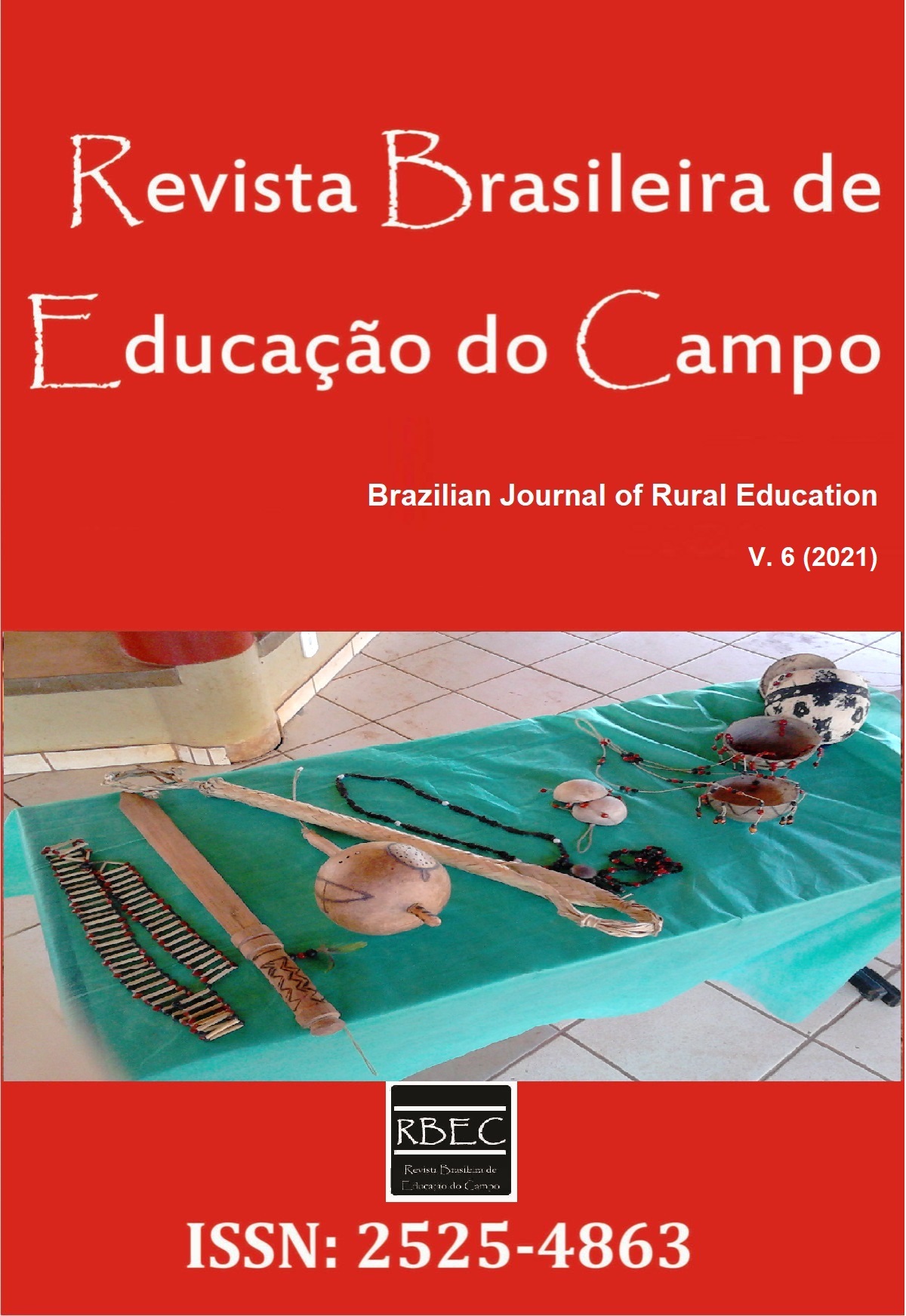Rural Education as a decolonial option: the building experience of the Institute of Latin American Agroecology (IALA-amazon)
DOI:
https://doi.org/10.20873/uft.rbec.e8488Abstract
ABSTRACT. This article focuses on the experience of building the Amazon IALA, particularly from the specialization course on “Rural Education, Agroecology and Agrarian Issues in the Amazon”, developed in a partnership between the Federal University of South and Southeast Pará and Via Campesina. The reflection points to some analytical shifts towards a decolonial option in education from a pedagogical experience connected politically and epistemologically to the social struggles and disputed territories in southeastern Pará. Education as a political demand of the people of the countryside transforms the context of conflicts rather than the realization of the pedagogical dynamics that thus becomes an integral part of the subjects' political subjectivation processes. The encounter with social struggles also becomes a recognition of the forms of denial of the possibilities of epistemic agency to subaltern individual and collective subjects, leading to an option for epistemic disobedience, to restore these wasted experiences to the field of knowledge and thus, broaden the meanings of the relationship between the university and social movements, facing the contradictions of the institutionalization processes, expanding the forms of knowledge circulation and ensuring the dialogue of knowledge as an effective practice.
Downloads
References
Aguilar, R. G. (2013). Conocer las luchas y desde las luchas. Reflexiones sobre el despliegue polimorfo del antagonismo: en trama dos comunitarios y horizontes políticos. Acta Sociológica, 62, 11-30. Recuperado de https://www.sciencedirect.com/science/article/pii/S0186602813709976. https://doi.org/10.1016/S0186-6028(13)70997-6.
Alier, J. M. (2007). O ecologismo dos pobres. São Paulo: Contexto.
Aráoz, H. M. (2010). El auge de la minería transnacional en América Latina: de la ecología política del neoliberalismo a la anatomía política del colonialismo. In: H. Alimonda (Org.), La naturaleza colonizada. Ecología política y minería en América Latina. (pp. 135-180). Buenos Aires: CLACSO.
Bhabha, H. K. (2003). O local da cultura. Belo Horizonte: Editora da UFMG.
Bondía, J.L. (2002). Notas sobre a experiência e o saber de experiência. Revista Brasileira da Educação, 19, 20-28. Recuperado de http://www.scielo.br/pdf/rbedu/n19/n19a02.pdf.
Bourdieu, P. (1989). O poder simbólico. Rio de Janeiro: Bertrand Brasil.
Bourdieu, P. (1996). Razões práticas. Sobre a teoria da ação. Campinas: Papirus.
Bourdieu, P. (2004). Os usos sociais da ciência: por uma sociologia clínica do campo científico. São Paulo: Editora UNESP.
Dussel, E. (1973). El método analectico y la filosofía latinoamericana. In: O. Ardiles et al. (Org.), Hacia una filosofía de la liberación latino-americana: enfoques latinoamericanos. (pp. 118-137). Buenos Aires: Editorial BONUM.
Escobar, A. (2014). Sentipensar con la tierra: nuevas lecturas sobre desarrollo, territorio y diferencia. Medellín: Unaula.
Fals Borda, O. (1981). Aspectos teóricos da pesquisa participante: considerações sobre o significado e o papel da ciência na participação popular. In: C. R. Brandão (Org.), Pesquisa participante. (pp. 42-62). São Paulo: Brasiliense.
Foucault, M. (1990). Microfísica do poder. (9a ed.). Rio de Janeiro: Graal.
Harvey, D. (2004). O novo imperialismo. São Paulo: Loyola.
Instituto Nacional de Colonização e Reforma Agrária. (2014). Programa Residência Agrária. Brasília, DF: INCRA. Recuperado de http://portal.incra.gov.br/?q=tree/info/file/15158/.
Malheiro, B. C. P., & Ribeiro, B. (2014). Contexto, texto e intertexto: abrindo as perspectivas do olhar sobre a educação do campo. In: H. Souza, I. Santiago, & N. Brito (Org.), Práticas contra-hegemônicas na formação de educadores: reflexões a partir do curso de Licenciatura em Educação do Campo do sul e sudeste do Pará. (pp. 23-53). Brasília: MDA.
Martins, J. S. (1997). Fronteira: degradação do outro nos confins do humano. São Paulo: Hucitec.
Mignolo, W. D. (2003). Histórias locais/Projetos globais. Belo Horizonte: Editora da UFMG.
Mignolo, W. D. (2008). Desobediência epistêmica: a opção descolonial e o significado de identidade em política. Cadernos de letras da UFF, 34, 287-324. Recuperado de http://www.cadernosdeletras.uff.br/joomla/images/stories/edicoes/34/traducao.pdf.
Moore, A. (2018). Repensar a escala como uma categoria geográfica: da análise para a prática. GEOgraphia, 20(42), 3-24. Recuperado de http://periodicos.uff.br/geographia/article/view/13829/9032. https://doi.org/10.22409/GEOgraphia2018.v20i42.a13829.
Quijano, A. (1992). Colonialidad y modernidad/racionalidad. In: H. Bonilla (Org.), Los conquistados: 1492 y la población indígena de las América. (pp. 123-145). Quito: Tercer Mundo Editors.
Rancière, J. (1996). O desentendimento. São Paulo, Editora 34.
Silva, I. S. (2014). Histórias de vida em formação: autopoiésis e práxis coletiva. In: H. Souza, I. Santiago, & N. Brito (Org.), Práticas contra-hegemônicas na formação de educadores: reflexões a partir do curso de Licenciatura em Educação do Campo do sul e sudeste do Pará. (pp. 57-78). Brasília, DF: MDA.
Sousa Santos, B. (2007). A crítica da razão indolente: contra o desperdício da experiência. (6a ed). São Paulo: Cortez.
Thompson, E. P. (1981). A miséria da teoria. Rio de Janeiro: Zahar.
Walsh, C. (2008). Interculturalidad crítica y pedagogía de-colonial: apuestas (des)de el insurgir, re-existir y re-vivir. Quito: Universidad Andina Simón Bolívar. Recuperado de:https://www.maxwell.vrac.puc-rio.br/13582/13582.PDFXXvmi=di9ixOJob3xjBuscxZPZhgoEsplxlhlzBvSzkDZvGWP.
Walsh, C. (Ed.). (2013). Pedagogías decoloniales: prácticas insurgentes de resistir, (re)existir y (re)vivir. (Tomo I). Quito: Ediciones Abya-Yala.
Published
How to Cite
Issue
Section
License
Proposal for Copyright Notice Creative Commons
1. Policy Proposal to Open Access Journals
Authors who publish with this journal agree to the following terms:
A. Authors retain copyright and grant the journal right of first publication with the work simultaneously licensed under the Creative Commons Attribution License that allows sharing the work with recognition of its initial publication in this journal.
B. Authors are able to take on additional contracts separately, non-exclusive distribution of the version of the paper published in this journal (ex .: publish in institutional repository or as a book), with an acknowledgment of its initial publication in this journal.
C. Authors are permitted and encouraged to post their work online (eg .: in institutional repositories or on their website) at any point before or during the editorial process, as it can lead to productive exchanges, as well as increase the impact and the citation of published work (See the Effect of Open Access).















